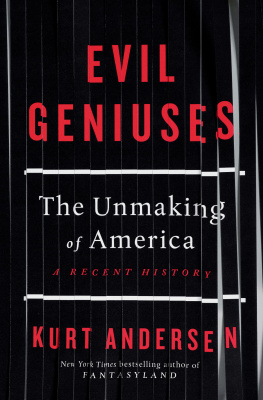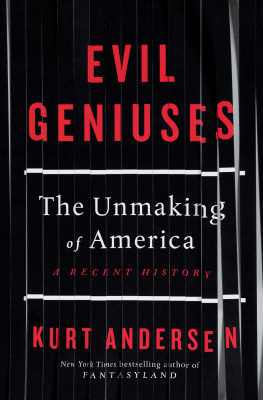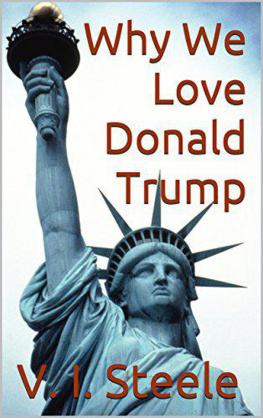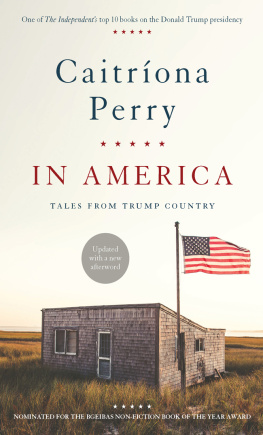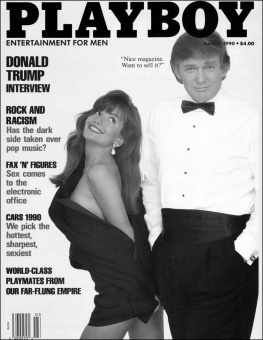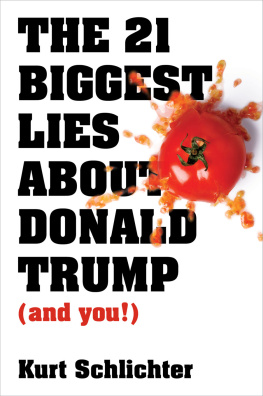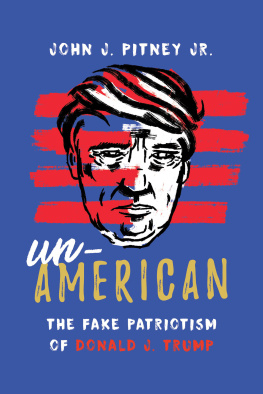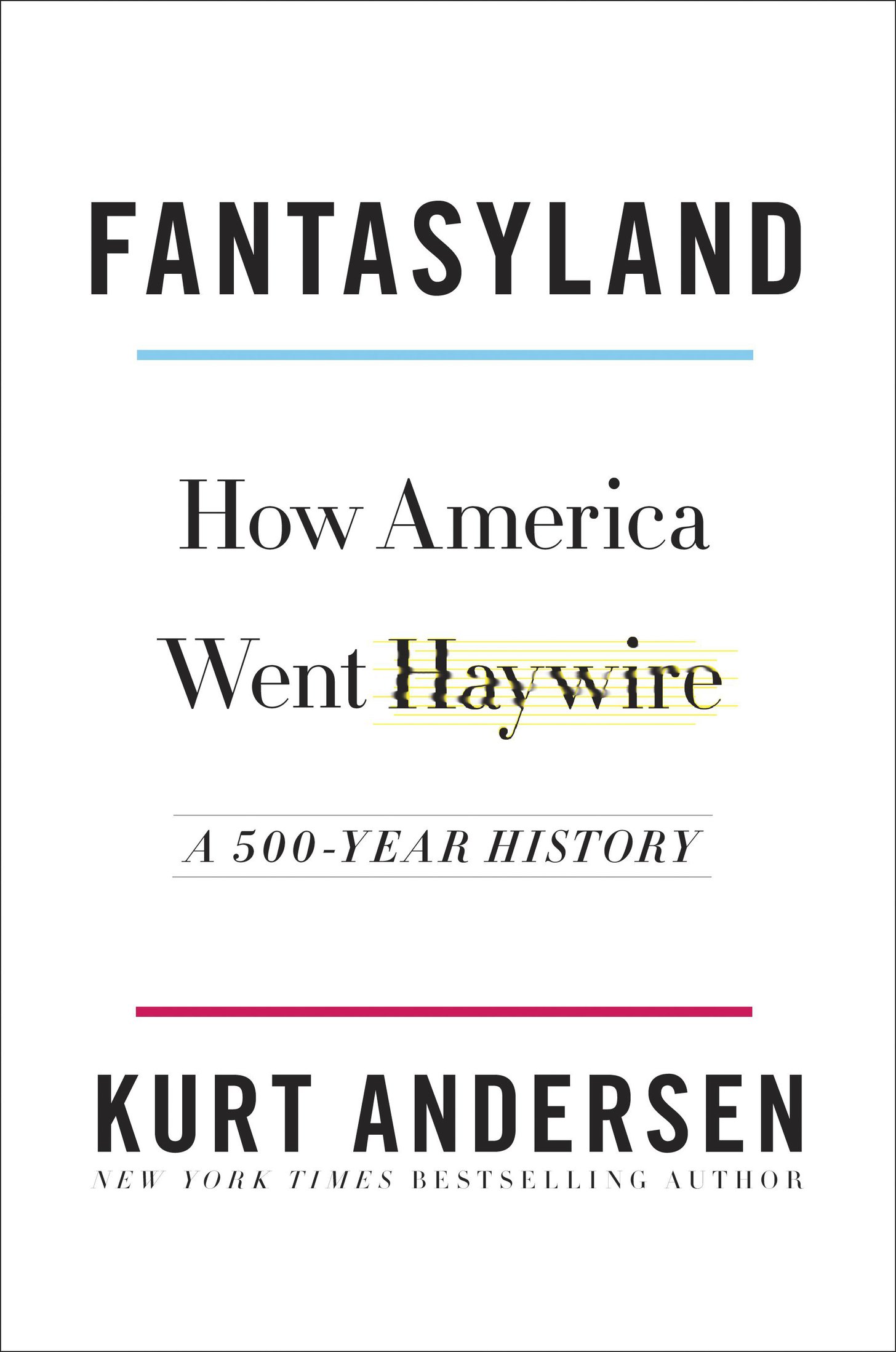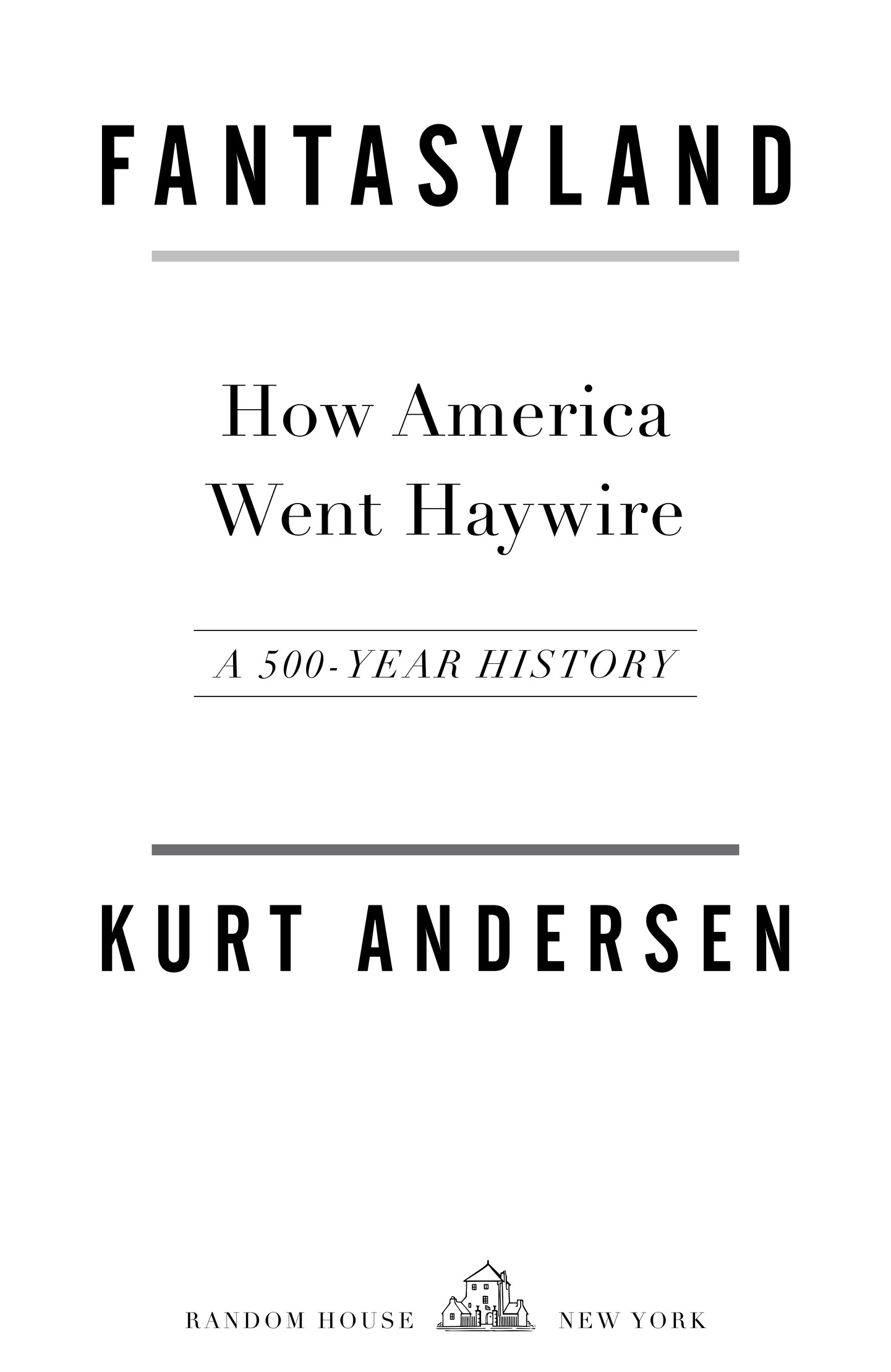Copyright 2017 by Kurt Andersen
All rights reserved.
Published in the United States by Random House, an imprint and division of Penguin Random House LLC, New York.
R ANDOM H OUSE and the H OUSE colophon are registered trademarks of Penguin Random House LLC.
Some passages in Fantasyland were originally published in different forms in The New Yorker, New York, Time, and The New York Times.
Library of Congress Cataloging-in-Publication Data
Names: Andersen, Kurt, author.
Title: Fantasyland : how America went haywire : a 500-year history / Kurt Andersen.
Description: New York : Random House, 2017. | Includes index.
Identifiers: LCCN 2017016052 | ISBN 9781400067213 | ISBN 9781588366870 (ebook)
Subjects: LCSH: National characteristics, American. | United StatesCivilization. | Popular cultureUnited StatesHistory.
Classification: LCC E169.1 .A543 2017 | DDC 973dc23
LC record available at https://lccn.loc.gov/2017016052
randomhousebooks.com
Book design by Susan Turner, adapted for ebook
Cover design: Rachel Ake
v4.1_r2
ep
Contents
The easiest thing of all is to deceive oneself; for we believe whatever we want to believe.
D EMOSTHENES
Unceasingly we are bombarded with pseudo-realities. Reality is that which, when you stop believing in it, doesnt go away.
P HILIP K . D ICK
You are entitled to your own opinion, but you are not entitled to your own facts.
D ANIEL P ATRICK M OYNIHAN
1
Now Entering Fantasyland
T HIS BOOK HAS BEEN GERMINATING for a long time. In the late 1990s I wrote a few articles pointing toward itabout American politics morphing into show business and baby boomers trying to stay forever young, about untrue conspiracy theories being mainstreamed and the explosion of talk radio as it became more and more about the hosts wild opinions. In 1999 I published a novel about a TV producer who created two groundbreaking showsa police drama in which the fictional characters interact with real police arresting real criminals, and a news program featuring scenes of the anchors private lives.
But the ideas and arguments really started crystallizing in 2004 and 2005. First President George W. Bushs political mastermind Karl Rove introduced the remarkable phrase reality-based community. People in the reality-based community, he told a reporter, believe that solutions emerge from judicious study of discernible reality. Thats not the way the world really works anymore. He said it with a sense of humor, but he was also deadly serious. A year later TheColbert Report went on the air. In the first few minutes of his first episode, Stephen Colbert, playing his right-wing populist character, performed a feature called The Word in which he riffed on a phrase. Truthiness, he said.
Now Im sure some of the word police, the wordinistas over at Websters, are gonna say, Hey, thats not a word! Well, anybody who knows me knows that Im no fan of dictionaries or reference books. Theyre elitist. Constantly telling us what is or isnt true. Or what did or didnt happen. Whos Britannica to tell me the Panama Canal was finished in 1914? If I wanna say it happened in 1941, thats my right. I dont trust bookstheyre all fact, no heart.Face it, folks, we are a divided nationdivided between those who think with their head and those who know with their heart.Because thats where the truth comes from, ladies and gentlementhe gut.
Whoa, yes, I thought: exactly. America had changed in this particular, peculiar way, I realized. Until the 2000s, truthiness and reality-based community wouldnt have made much sense as jokes.
My understanding of how this change occurred became clearer a few years later, when I started work on a novel about a group of kids who in the early 1960s role-play James Bond stories, and then in 1968, as college students, undertake a real-life Bond-like antigovernment plot. During the 1960s, reality and fantasy blurred problematically, for my characters and for plenty of real Americans. In the course of researching and thinking through that story, I came to understand the era and its impacts in a new way. For all the fun, and all the various positive effects of the social and cultural upheavals, I saw that it was also the Big Bang moment for truthiness. And if the 1960s amounted to a national nervous breakdown, we are mistaken to consider ourselves over it, because what people say about recovery is true: youre never really cured.
I realized too that this complicated American phenomenon I was trying to figure out had been not just decades but centuries in the making. In order to understand our weakness for fantasy of all kinds, I needed to follow the tendrils and branches and roots further backall the way back, to Americas beginnings.
Youre not going to agree with me about all the various mental habits and beliefs and behaviors I classify here as imaginary or fantastical. You may find me too judgmental about matters of deep personal conviction. As I pass by fish in barrels, I will often shoot them. But I dont consider all religion or all alternative belief systems or all conspiracy theories or all impossible dreams misguided. Each of us is on a spectrum somewhere between the poles of rational and irrational. We all have hunches we cant prove and superstitions that make no sense.
Whats problematic is going overboard, letting the subjective entirely override the objective, people thinking and acting as if opinions and feelings were just as true as facts. The American experiment, the original embodiment of the great Enlightenment idea of intellectual freedom, every individual free to believe anything she wishes, has metastasized out of control. From the start, our ultra-individualism was attached to epic dreams, sometimes epic fantasiesevery American one of Gods chosen people building a custom-made utopia, each of us free to reinvent himself by imagination and will. In America those more exciting parts of the Enlightenment idea have swamped the sober, rational, empirical parts.
Little by little for centuries, then more and more and faster and faster during the last half-century, Americans have given ourselves over to all kinds of magical thinking, anything-goes relativism, and belief in fanciful explanation, small and large fantasies that console or thrill or terrify us. And most of us havent realized how far-reaching our strange new normal has become. The clich would be the frog in the gradually warming pot, oblivious to its doom until too late.
Much more than the other billion or two people in the rich world, we Americans believereallybelievein the supernatural and miraculous, in Satan on Earth now, reports of recent trips to and from Heaven, and a several-thousand-year-old story of lifes instantaneous creation several thousand years ago.
At the turn of the millennium, our financial industry fantasized that risky debt was no longer risky, so many tens of millions of Americans fantasized that they could live like rich people, given our fantasy that real estate would always and only increase in value.


